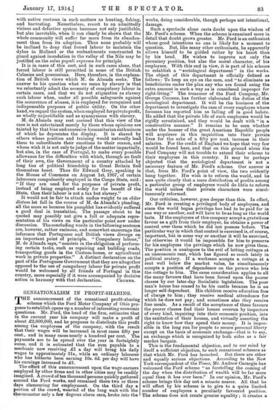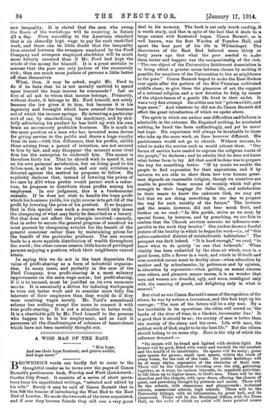SENSATIONALISM IN PROFIT-SHARING.
ITIIIE announcement of the sensational profit-sharing 1 scheme which the Ford Motor Company of Ohio pro- poses to establish opens up a number of interesting economic questions. Mr. Ford, the head of the firm, estimates that in the current year his company will make a profit of about £2,000,000, and he proposes to distribute this profit among the employees of the company, with the result that their wages will be increased in most cases fifty per cent., and in many cases nearly a hundred per cent. The payments are to be spread over the year in fortnightly sums, and it is estimated that the sum payable to a mechanic now receiving £1 a day will bring his daily wages to approximately 31s., while an ordinary labourer who has hitherto been earning 10s. 6d. per day will have his earnings increased to Li.
The effect of this announcement upon the wage-earners employed by other firms and in other cities may be readily imagined. A crowd of ten thousand persons quickly gathered around the Ford works, and remained there two or three days clamouring for employment. On the third day a portion of the crowd, wearied of the long wait with the thermometer only a few degrees above zero, broke into the works, doing considerable, though perhaps not intentional, damage.
Such a spectacle alone casts doubt upon the wisdom of Mr. Ford's scheme. When the scheme is examined more in detail that doubt grows greater. Mr. Ford is an enthusiast whose good intentions no one is likely for a moment to question. But, like many other enthusiasts, he apparently allows himself to be guided rather by hie heart than by his head. He wishes to improve not only the pecuniary position, but also the moral character, of his employees. With this end in view, it is part of his scheme to establish a " sociological department " in the works. The object of this department is officially defined as follows: To keep an eye on the men, and " to eliminate as beneficiaries under the plan any who are found using the extra amount in such a way as is considered improper for right-living." The treasurer of the Ford Company, Mr. George Cozzens, has further elaborated the duties of the sociological department. It will be the business of the department to investigate the case of every employee whose foreman has reported him as falling off in good habits. He added that the private life of such employees would be rigidly scrutinized, and they would be dealt with " in a constructive manner." It remains to be seen whether under the banner of the great American Republic people will acquiesce in this inquisition into their private lives for the sake of a fifty per cent. increase in their salaries. For the credit of England we hope that very few would be found here, and that on this ground alone the Ford Company will not trouble to extend their scheme to their employees in this country. It may be perhaps objected that the sociological department is not a necessary feature of Mr. Ford's scheme. Our answer is that, from Mr. Ford's point of view, the two evidently hang together. His wish is to reform the world, and he sees quite clearly that a mere distribution of profits among a particular group of employees would do little to reform the world unless their private characters were simul- taneously reformed.
Our criticism, however, goes deeper than this. In effect, Mr. Ford is creating a privileged body of employees, and since the world began privilege has bad to be paid for in one way or another, and will have to be as long as the world lasts. If the employees of this company accept a gratuitous favour as a gift from their employer, he obtains a power of control over them which he did not possess before. The particular way in which that control is exercised is, of course, important, but in some way or another it will be exercised, for otherwise it would be impossible for him to preserve for his employees the privilege which he now gives them. The position is analogous to the evil of letting cottages at an uneconomic rent, which has figured so much lately in political oratory. If a workman accepts a cottage at a rent well below the market value, he simultaneously accepts a position of dependence on the person who lets the cottage to him. The same consideration applies to all the many favours that have been forced upon the poorer classes by our later-day Socialistic legislation. The poor man's house has ceased to be his castle because he is no longer self-dependent. His children receive education free of charge to him ; they receive medical attendance for which he does not pay ; and sometimes also they receive free meals. As a result of the acceptance of these favours the poorer classes find their homes overrun by inspectors of every kind, inquiring into their economic position, into the sanitation of their houses, and virtually asserting the right to know how they spend their money. It is impos- sible in the long run for people to secure personal liberty except on the basis of economic exchange—that is to say, an exchange which is recognized by both sides as a fair market bargain. This is the fundamental objection, and to our mind by itself a sufficient objection, to such sensational schemes as that which Mr. Ford has launched. But there are other and equally serious objections. According to the Now York correspondent of the Times. Mr. Andrew Carnegie has welcomed the Ford scheme "as foretelling the coming of the day when the distribution of wealth will be far more equal than it has ever been." In our opinion, Mr. Ford's scheme brings this day not a minute nearer. All that he will effect by his scheme is to give to a quite limited number of employees a peculiarly favoured position. The scheme does not create greater equality ; it creates a
new inequality. It is stated that the men who sweep the floors of the workshops will be receiving in future £1 a day. Even according to the American standard that is an absurdly high wage to pay for such unskilled work, and there can be little doubt that the inequality thus created between the sweepers employed by the Ford Company and sweepers employed elsewhere will be much more bitterly resented than if Mr. Ford had kept the whole of the money for himself. It is a great mistake to assume that the poor are only jealous of the excessively rich ; they are much more jealous of persons a little better off than themselves.
What, then, it may be asked, ought Mr. Ford to do if he feels that be is not morally entitled to spend upon himself the huge income he commands ? Let us first of all ask to whom that income belongs. Primarily, without doubt, it belongs to Mr. Ford himself, not solely because the law gives it to him, but because it is his ingenuity and foresight which have created the business out of which the income springs. By inventing a particular sort of car, by standardizing his machinery, and by skil- fully advertising his product he bas built up with his own brain an enormously profitable business. He is much in the same position as a man who has invented some device for giving service to the public and draws a huge royalty from its sale—with this difference, that his profits, unlike those arising from a patent of invention, are not secured to him by law, and may disappear the moment some rival firm has the enterprise to undersell him. The money is therefore fairly his. That ho should wish to spend it, not on his own personal satisfaction, but on doing good to his fellow-men, is all to his credit, and our only criticism is directed against the method he proposes to follow. He explicitly declares that, instead of lowering the prices of his cars by £10 when profits would permit such a reduc- tion, he proposes to distribute those profits among his employees. In our judgment, this is a fundamental mistake. If he does not wish to handle the huge profit which his business yields, his right course is to get rid of the profit by lowering the price of his product. It so happens that in this special case such a course would only mean the cheapening of what may fairly be described as a luxury. But that does not affect the principle involved—namely, that in order to secure the general progress of mankind we must proceed by cheapening articles for the benefit of the general consumer rather than by maintaining prices for the benefit of the particular producer. The one course leads to a more equable distribution of wealth throughout the world ; the other course creates little knots of privileged persons enjoying a position which their neighbours cannot attain.
In saying this we do not in the least depreciate the value of profit-sharing as a form of industrial organiza- tion. In many cases, and probably in the case of the Ford Company, true profit-sharing is a most salutary improvement on the mere wage nexus ; but profit-sharing, if it is to succeed, must be justified on its own economic merits. It is essentially a device for inducing workpeople to turn out better work and to consider more fully the interests of their employers than they would do if they were receiving wages merely. Mr. Ford's sensational scheme has nothing except the name to connect it with true profit-sharing. It is not a stimulus to better work. It is a charitable gift by Mr. Ford himself to the persons who happen to be in his employment, and as such it possesses all the disadvantages of schemes of benevolence which have not been carefully thought out.











































 Previous page
Previous page